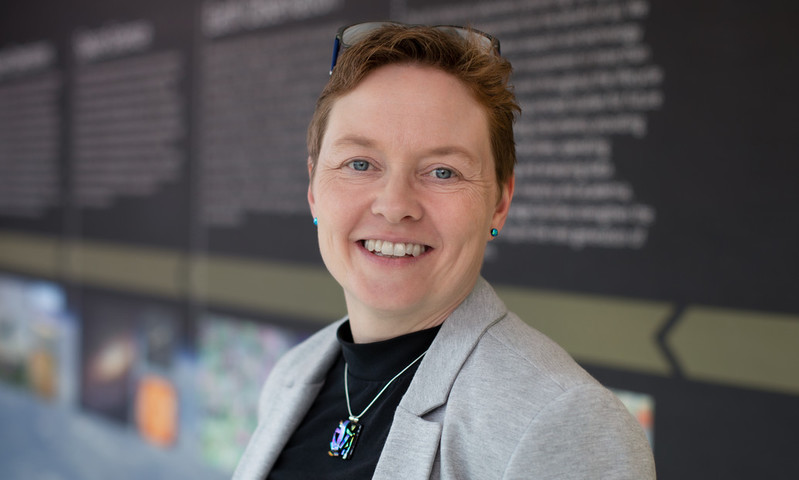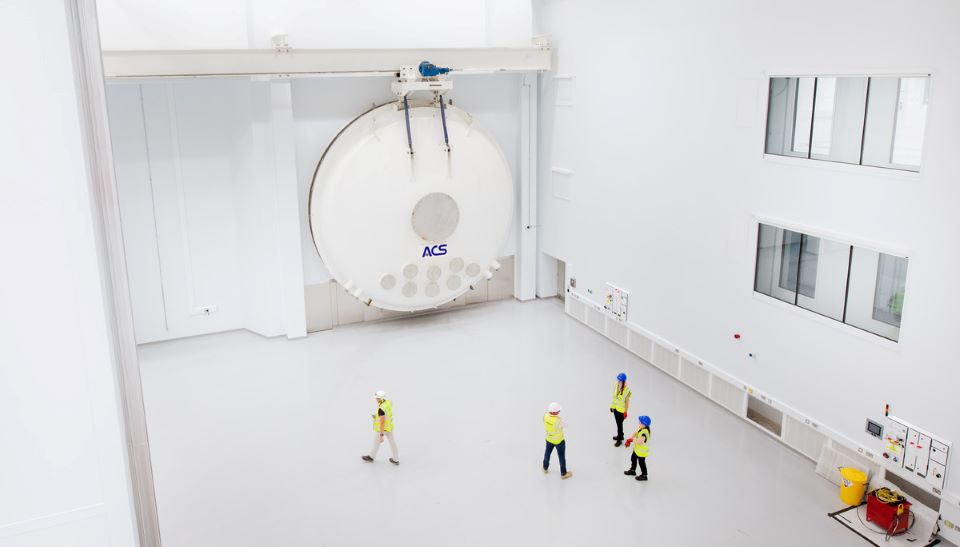
Article originally published by The Engineer | Original article
Having been involved with the space sector for over 25 years, she speaks passionately about the opportunities on the horizon for Britain as new capabilities come to fruition.
Beginning her career as an astronomer, Beardsley moved into lunar science which brought her to RAL Space - the UK's national laboratory for space science and technology development - in 2002. There, she worked on the D-CIXS spectrometer which flew on SMART-1, Europe's very first Moon mission in 2003.
“Once I was here I realised that actually doing the science wasn't my thing – what I really loved doing was working with the teams of people that are actually involved in making these missions happen," she told The Engineer, explaining a career trajectory that has led to her heading up the entire laboratory.
Beardsley moved into project management, working on a number of solar physics missions including the US-based Solar Dynamics Observatory and GOCE missions which used RAL Space's camera electronics, alongside RAL's involvement working on the ExoMars Rover.
“About six or seven years ago I became…head of an engineering team which grew from 40 to 70 people by the time I'd finished, of mechanical engineers, thermal engineers – and that's where I got more into the people management side of things," she explained.
In the space sector, where you're constantly pushing the boundaries of technology
Now, with a headcount of around 350 people at RAL Space, Beardsley looks after the company's entire breadth of activity, from its engineering offering in creating new scientific instrumentation for missions, through to the National Satellite Test Facility – a £150m investment from the government to create a 'one-stop shop' for testing the UK's satellites ready for launch.
“We also have quite an extensive scientific computing facility, which underpins and supports tens of thousands of scientists across the UK in accessing data for earth observation missions," she said.
“I'm also now looking more externally at how we can better support the UK community, especially with the release of the National Space Strategy.
It's really important that we plug into that from the UK perspective, but also to look internationally as well, because all of our scientific endeavours have to be international collaborations. It's important for me to establish those connections across the world."
The government's National Space Strategy, published in 2021, put forward a ten point plan for growing the UK's space economy and unlocking opportunities for space technology in areas that include modernising transport, improving public services and fighting climate change.

“It's really nice to see the National Space Strategy come together and come to life," said Beardsley, adding that whilst the government's commitment in space has been there for a while, it hadn't been coordinated in this way before.
“It's nice to see that coordination and that emphasis on driving space forward and recognising space as the important sector that it is for the future of the UK economy," she said.
Whilst having launch capabilities will be a huge step forward for the UK space sector in itself, there are vast opportunities in many other areas, such as looking at the security of the Earth from space and the impact of space weather. “So much of our day to day lives now are dependent on … the use of space," said Beardsley. “I don't think everybody realises quite how much our lives are intimately entwined in space and if there was a big event from the Sun that knocked out a lot of our satellites, that could have a dramatic impact on our lives on Earth."
At the time of writing, the UK was still awaiting its first successful launch into orbit. Although Virgin Orbit's LauncherOne rocket departed Spaceport Cornwall atop the modified Boeing 747 'Cosmic Girl' on 9th January, a technical 'anomaly' prevented it from reaching its target orbit.
“So many opportunities are there and it's really hard to pin down a particular area where [UK launch] is going to have the biggest impact," said Beardsley. “Because of the required location of where these spaceports are, it's creating a really good opportunity for different parts of the UK to have an involvement in space whereas they maybe wouldn't have had an involvement before. It's really playing to the government's levelling up agenda, to create roles and opportunities in different parts of the country. Obviously just being able to launch from our own country puts us into quite an elite club, if you like!"
While accessibility and cost has always been a barrier to space development, the future of UK space looks to be brightening, with launch costs coming down and the promise of continued cost reduction as space technology advances.
“Now that we've got space tourism, that's going to be a huge push for space in general to open up – it's going to offer many more opportunities for in-orbit manufacturing for example, I think that's going to be one of the next big things," Beardsley commented.
“There is a big move from the scientific perspective. It always used to be [about] big missions like the James Webb Space Telescope – which is absolutely phenomenal and we were involved in that as well, and that's returning amazing science – but there's been this huge shift towards smaller satellites that are cheaper, faster and provide some science.
“They'll never be able to compete with the likes of the James Webb Telescope but they can … get more rapid turnaround. I don't think we've fully exploited all of the opportunities around that at the moment, so that's an exciting area for us."
Aside from cost, skills is the UK space sector's other big barrier, Beardsley believes. “It's incredibly challenging to train up enough people for the science and technology and engineering that is required for the future.
“There's a lot of work being done around encouraging young people into STEM careers, but one of the things we also need to recognise is that it's not just STEM careers that make space happen. There are a lot of other background careers as well."
Emphasising the range of opportunities in space, and the fact that there's 'something in Space for everyone', is crucial to encouraging people into the sector and fostering its growth, she added. Creating an inclusive culture within the space sector is also vital and, whilst there's still a long way to go, progress is being made.
“As I go through my career and I look back, I genuinely feel that there are more female faces for me to relate to now than in the past," said Beardsley. “It's not just gender diversity, it's diversity of thought as well, and only by having true inclusivity in your environment will you actually get that.
“In the space sector, where you're constantly pushing the boundaries of technology, you have to have that diversity of thought to be as innovative as you can."
Republished with permission
